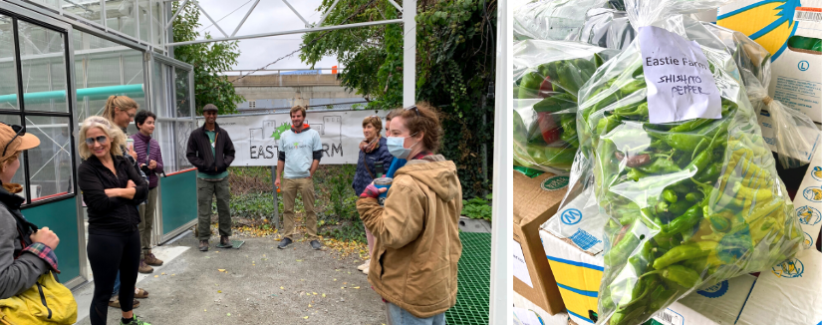Partner Spotlight: Eastie Farm

When we talk with our hunger-relief partner Eastie Farm about their work over the past year, the first thing they mention is the need.
The need for better access to affordable food in East Boston. The need for fresh, organic produce. The need for equitable opportunities for health and well-being.
“There is one grocery store here in East Boston—there are bodegas and stores like that—but the area is like an island and everyone is locked into those prices and sources of food,” said Jenny Wechter, who coordinates Eastie Farm’s Climate Corps and development work. “Food access and food need are a huge challenge—especially for fresh produce. The simplest food is actually very expensive, and organic just isn’t even an option.”
Eastie Farm began in 2015 when a group of community members and neighbors came together to transform abandoned land in East Boston into a thriving urban garden. In the years since, they have grown into a community hub for improving food access, learning about urban agriculture and nature, advocating for climate justice, and building community resilience through connection and education.
Today, they own two sites in East Boston and operate five others, serving clients who struggle to access the food and resources they need.
Gaining Ground’s partnership with Eastie Farm began in 2020 when the pandemic struck and caused a crisis of food insecurity that disproportionately affected under-resourced communities in Greater Boston and Eastern Massachusetts.
“Because of the high need, Eastie Farm worked with local restaurants to make and deliver 5,000 hot meals per week to community members,” said Jenny. “One of the things that makes Eastie Farm really unique is that we are in touch with people who are otherwise very hard to reach—linguistically isolated community members, undocumented community members—we make sure that their needs are met.”
Although food insecurity stabilized for some communities over the past months and years, we know it is again rising to dire levels. As of August 2022, Project Bread estimates that 26.2 percent of households with children in Massachusetts are facing food insecurity, surpassing the May 2020 spike that took place at the onset of the pandemic. And East Boston is feeling the effects acutely.
“You see it in how quickly people show up [for food distributions]. There is always a line and there are always people showing up after we finish,” said Jenny. “Since the pandemic, job insecurity has been a major challenge; people here—many of whom are immigrants from El Salvador, Ecuador, Peru, Brazil, and elsewhere—took such a hit during the pandemic and they are still in it. So accessing food, much less paying for it, is difficult.”

We are grateful to partner with Eastie Farm, especially because we see the significant impact they have on food insecurity and food justice in East Boston. Each week, they operate a CSA for 400 families that is striving to meet rising demand. CSA stands for Community Supported Agriculture, a system in which a farm is supported by local consumers who purchase shares in the farm’s output, which they receive throughout the growing season.
“What makes the food aid program at Eastie really unique is that we’re working to break down the food aid stigma,” said Jenny. “We sell CSAs at market rate for any community members who can afford it, but all of our food aid is also through our CSA. So people who need reduced or free food—which is maybe the majority of our CSA shares—stand in line with everyone else. So, you’re not standing in a food aid line. You’re standing in a line of community members who want local, seasonal, affordable food.”
It is through their free shares of food that Eastie Farm distributes Gaining Ground’s fresh, organic produce to local community members struggling to access the food they need.
In addition to these efforts, they have recently completed construction of a geothermally-powered greenhouse, which they’re hoping to use to grow up to 7,000 pounds of food annually. This summer their work also included their Junior Farmers Program, an elementary age summer program through the Boston Public Schools, as well as their Youth Climate Corps, in which high school students help grow and distribute produce, teach local youths about food justice and sustainability, care for seedlings, and tend newly planted trees in the neighborhood.
We would like to thank Jenny for taking the time to speak with us. We’re grateful for the outstanding work that Eastie Farm does and are thrilled to be partnering with them to bring fresh, organic produce from Gaining Ground to our neighbors experiencing food insecurity in East Boston.
To learn more about Eastie Farm, the work they do in East Boston, and ways in which they are looking for more support and involvement, you can visit their website here.